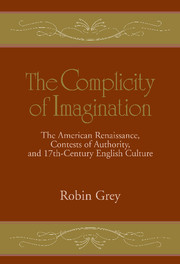 The Complicity of Imagination
The Complicity of Imagination Published online by Cambridge University Press: 05 November 2009
I have been reading the lives of Lord Herbert of Cherbury, and of Sir Kenelm Digby. These splendid, chivalrous, and thoughtful Englishmen are meat which my soul loveth, even as much as my Italians. What I demand of men, – that they could act out all their thoughts, – these have. They are lives; – and of such I do not care if they had as many faults as there are days in the year, – there is the energy to redeem them. Do you not admire Lord Herbert's two poems on life, and the conjectures concerning celestial life? I keep them.
Margaret Fuller to EmersonI have a great share of Typhon to the Osiris, wild rush and leap, blind force for the sake of force.
Margaret Fuller, MemoirsDante, thou didst not describe, in all thy apartments of Inferno, this tremendous repression of an existence half unfolded; this swoon as the soul was ready to be born.
Margaret Fuller to Caroline SturgisWhile Margaret Fuller's alienation from “provincial” American culture has been compellingly delineated and her flight from “feminine” sentimental fiction to “masculine” republican history has been provocatively posed, her sense of being out of place in her own age has gone unremarked, although it is everywhere apparent in the nostalgia that pervades her depictions of seventeenth-century English culture. In the first epigraph to this chapter, her admiration of Lord Herbert of Cherbury and Sir Kenelm Digby – both courtiers and pious philosophers in the age of James I and Charles I – reveals the scope of the active life that she herself craves (“meat which my soul loveth”).
To save this book to your Kindle, first ensure [email protected] is added to your Approved Personal Document E-mail List under your Personal Document Settings on the Manage Your Content and Devices page of your Amazon account. Then enter the ‘name’ part of your Kindle email address below. Find out more about saving to your Kindle.
Note you can select to save to either the @free.kindle.com or @kindle.com variations. ‘@free.kindle.com’ emails are free but can only be saved to your device when it is connected to wi-fi. ‘@kindle.com’ emails can be delivered even when you are not connected to wi-fi, but note that service fees apply.
Find out more about the Kindle Personal Document Service.
To save content items to your account, please confirm that you agree to abide by our usage policies. If this is the first time you use this feature, you will be asked to authorise Cambridge Core to connect with your account. Find out more about saving content to Dropbox.
To save content items to your account, please confirm that you agree to abide by our usage policies. If this is the first time you use this feature, you will be asked to authorise Cambridge Core to connect with your account. Find out more about saving content to Google Drive.